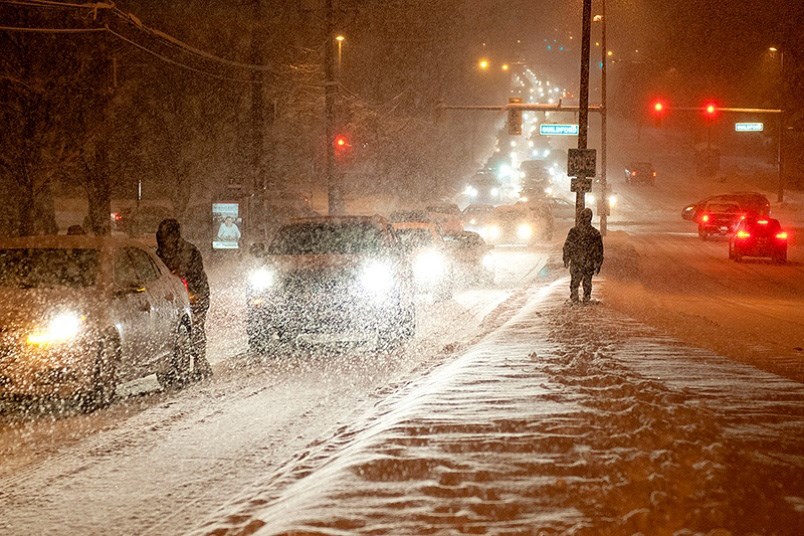It hasn’t snowed yet this winter but, when it does, Port Moody’s director of operations says the city will be better prepared than it has been in previous years.
In a report presented to council in December, Jeff Little said 41 of 55 action items identified in a review of the city’s winter road maintenance strategy have been completed while the rest are underway or are being addressed on an ongoing basis.
But he cautioned that consecutive snow events or a storm that persists for longer than 24 hours will continue to be a challenge for the city because of staffing and equipment limitations.
A review of snow clearing operations in the city was commissioned by council following the winter of 2016/’17, when several storms through December and into early January locked many streets and sidewalks in snow and ice. The harsh conditions that winter also resulted in the city spending almost twice as much for road maintenance as the $209,000 it laid out in 2015.
Little said a new priority system that classifies the maintenance of Port Moody’s roads and sidewalks according to their importance in moving commuter traffic and getting pedestrians to SkyTrain stations will also apply to brining and salting before snowstorms, and clearing them when a storm hits.
That means arterial routes — including Ioco Road, Murray Street, Guildford Way and David Avenue — that allow movement of traffic across the city and connect with regional transportation corridors will get cleared first, with ongoing attention around the clock.
Collector routes like St. George and Union streets, and roads that also provide access to the city’s utility infrastructure, are designated second priority but will also be kept clear on a 24-hour basis while local roads are designated third priority and will be cleared during normal business hours, from 7:30 a.m. to 3:30 p.m., after priority routes are clear.
Salting and plowing Barnet Highway and St. Johns Street is contracted out.
A similar priority system is also being applied to Port Moody’s sidewalks, with 24/7 attention to sidewalks in front of city property, bus stops as well as crosswalks and medians within an 800-metre radius of PoMo's two SkyTrain stations.
Property owners, meanwhile, must have sidewalks in front of their home or business cleared by 10 a.m., with escalating fines to ensure compliance. The city sent out letters in early December reminding property owners of their obligation but Little said most owners have been attentive.
“Our experience was we had generally good levels of compliance,” he said.
But all the planning and prioritizing of routes will become more difficult if the city is deluged with an extended snow event or several consecutive ones, or if staffing is depleted by illness, Little said. While the city has 10 pieces of heavy equipment that can be deployed for snow clearing, some of it, like its two backhoes and single front-end loader, also have to be available in case another emergency to city infrastructure, like a broken water main, occurs.
And if fatigue or illness like the flu starts running through the 10 to 14 staff tasked with getting the city through a snow storm, the challenge could be amplified, Little said.
“We really have challenges in sustaining longer durations,” he said, adding staff could be reassigned from other departments. “We’ll have to adjust our priorities from time to time.”



